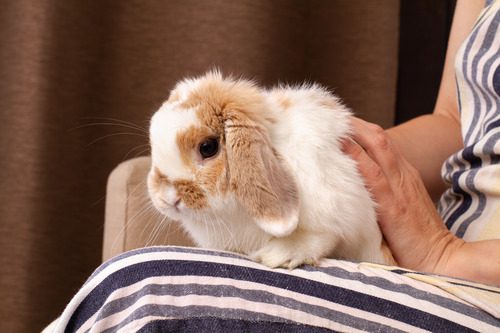Why is My Rabbit Shaking?
Rabbits are gentle, expressive animals, but when they start shaking, it can be alarming for pet owners. Shaking in rabbits can be caused by various factors, from stress and temperature changes to more serious health concerns. If you notice your rabbit shaking, it’s natural to want to know the possible reasons behind it and when you should contact your veterinarian. At Keystone Animal Hospital in Bradenton, FL, we can help pet owners recognize the signs that their rabbit may need urgent attention. If you are concerned about your rabbit shaking, call us at (941) 741-8445 to schedule an appointment.

What Causes My Rabbit to Shake?
Shaking in rabbits can be linked to different factors, ranging from environmental stressors to underlying health conditions. Some common reasons your rabbit may be shaking include:
Stress and Anxiety
Rabbits are naturally anxious animals and can become stressed easily. Stress-induced shaking may occur due to sudden loud noises, unfamiliar environments, handling, or the presence of predators (such as cats or dogs). When rabbits feel threatened, their bodies react by trembling as a survival response. Signs of stress in rabbits may include the following:
- Flattening their bodies against the ground
- Rapid breathing
- Excessive hiding
- Refusing food
Provide a quiet, safe space, minimize handling, and ensure their environment is free from loud noises and potential threats.
Temperature-Related Shaking
Rabbits are sensitive to temperature changes and can start shaking if they feel too cold or overheated. Rabbits that are too cold may tremble as their bodies attempt to generate heat, whereas overheated rabbits can also shake as they struggle to regulate their body temperature.
Keep their living area between 60-70°F and provide proper bedding and shade.
Health-Related Causes of Rabbit Shaking
While stress and environmental factors are common causes of shaking, medical conditions can also be responsible. If your rabbit’s shaking is persistent, it is important to seek veterinary care to rule out underlying health problems.
Pain or Discomfort
Rabbits are prey animals, which means they often hide signs of illness or pain. Shaking may indicate discomfort due to an injury, digestive issues, or internal problems. Your rabbit may also shake due to dental disease, gastrointestinal stasis (GI stasis), arthritis, or an internal infection.
Keep an eye out for lethargy, loss of appetite, changes in posture, or grinding teeth as well.
Neurological Disorders
Certain neurological conditions such as head tilt (caused by ear infections or E. cuniculi), seizures, or nervous system disorders can cause shaking, twitching, or loss of coordination in rabbits. Symptoms of neurological issues include:
- Involuntary muscle movements
- Difficulty standing
- Unusual head positioning
Toxicity and Poisoning
Rabbits are curious creatures that may accidentally ingest toxic substances including certain houseplants, pesticides, cleaning chemicals, and human foods (such as chocolate or onions), leading to shaking or tremors. The following behaviors may indicate poisoning:
- Drooling
- Diarrhea
- Lethargy
- Loss of coordination.
Knowing When It’s Time to Contact Your Veterinarian
If your rabbit is shaking and showing additional symptoms, it is important to act quickly. Contact Keystone Animal Hospital in Bradenton, FL, at (941) 741-8445 if you notice:
- Persistent or intense shaking
- Loss of balance or coordination
- Difficulty breathing
- Loss of appetite or refusal to eat
- Signs of pain or distress
Understanding the reasons behind rabbit shaking can help you take appropriate action to keep your pet comfortable. Whether the cause is stress, temperature changes, or a medical condition, recognizing the signs and seeking timely veterinary care is essential. If you are unsure about your rabbit’s health, the experienced team at Keystone Animal Hospital is here to assist. Call us today at (941) 741-8445 to schedule an appointment and ensure your rabbit receives the best care possible.
